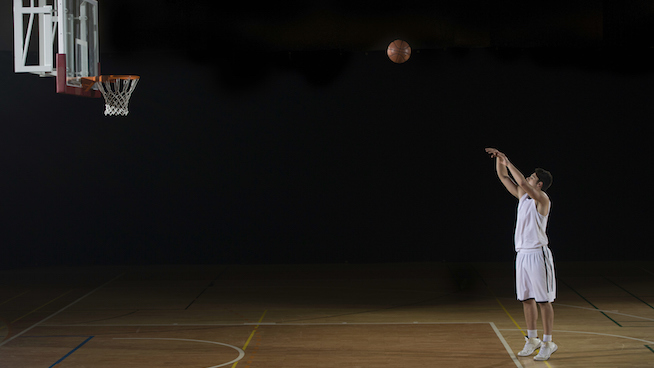You learn growing up as a basketball player that free throw shooting requires practice, fine-tuning your muscle memory, getting a feel, envisioning yourself taking the big one-and-ones with one second left to win the big one.
Conventional basketball wisdom is that repetition is paramount in shooting foul shots as it is in so many other aspects of life like selling, program management, and writing. If you shoot 500 a day, you’re more likely to shoot a higher percentage than if you shoot 100.
This mentality is similar to the theory some people believe that you need to do what you do for 10,000 hours in order to become skilled at a craft.
Is this true? We can’t be certain because very few things are. Isn’t 10,000 hours an arbitrary number? Yes. What about a person who is super talented? Maybe they don’t need to practice as much to make as many. All good points; there are no definitive answers, only theories. Life is full of questions without answers, theories that may or may not be right or wise or sustainable. This we grapple with day after day.
Unexpectedly I learned this week about a new theoretical mindset when it comes to shooting free throws. The Wake Forest men’s basketball team ranks third in the nation in free throw percentage at 80.54 percent. To say this is impressive is an understatement. There are 351 Division 1 men’s basketball programs. Wake ranks third. Head-turning stuff.
What’s their secret to being elite?
The answer is don’t practice them nor talk about them.
That’s what Wake coach Steve Forbes said this earlier in the week when asked how his team shines shooting foul shots.
He thinks it’s mostly mental anyway and talking about it now might get his players thinking about making them and that may get them to start missing more.
To not practice them and not talk about them and still be third in the nation is at minimum surprising and unconventional and more like amazing. Most basketball coaches emphasize to players the importance of practicing foul shots and focus on technique and form and getting in the repetitions in practice.
Not Wake. Not Forbes.
Forbes is right about this being a mind game of the highest order, for some a mental torture chamber. Shooting foul shots is about overcoming all the thoughts and doubts racing through your mind, blocking all the gym noise and self-consciousness that people are watching you, maybe talking about you, judging you, not liking you, wondering what your deal is, not getting distracted about a physics exam you have to study for later that night.
Michigan State coach Tom Izzo missed a crucial free throw in a high school game and he says that has been a motivating factor in his life ever since Missing drove him to become one of the game’s elite coaches. Now, decades after misfiring every day before practice he shoots 100 free throws and makes over 90 percent as a reminder to himself about the pain of losing and not coming through in the big moment. He plays a mind game with himself to this day on the free throw line.
I was one of those guys who did shoot a lot of free throws in the off season and during. All that work ultimately didn’t produce stellar results. I made about 60 percent, which isn’t good and embarrassing to admit. While on the line I found myself thinking about too many things in games and my focus and concentration weren’t locked in. I had too much on my mind when I needed to erase all thoughts other than reaching for the figurative “peach” inside the rim (the peach basket) with my follow through making sure there was enough arc.
I didn’t do this well in a few pressure situations that remain stuck in my mind to this second. I had two free throws to tie the game with under a minute to play. On the bench my coach and teammates tried to make light of the situation – my coach flipped around a towel in my direction — with me fully aware I was probably going to choke.
The reverse psychology didn’t work. I clanked both shots and we lost.
Damn. Wish I’d made those. That memory irks me this morning and fuels me to write better whatever that means.
It got to the point that season where I started a new technique, spreading my legs far apart, bending down low, setting the ball far off to the side of my head. For some reason it felt smooth and kept going in.
A few days later we played DeMatha, the best high school program in America, and I used that technique to made 12 of 14 from the line. We won the game and it was one of the greatest basketball moments of my life.
Of course my plan was to stick with the new technique, but in the next game I missed the first few and lost confidence so reverted back to my old way. Doubts about my new way, doubts about my old way. Doubts, doubts, doubts.
Feeling confident one day, losing confidence the next, trying something different, and thinking about all of this way too much both while practicing and in games.
Sports are often games of the mind. So is life overall. How we think and what thoughts we allow to remain in our heads are a huge factor in our success and happiness. Control your thoughts and you control your world.
Coach Forbes may be on to something. Don’t practice foul shots. Don’t think about them. Don’t talk about them. Just shoot them.
Without thinking.
Or just write this blog.
Without thinking. Without wondering. Without self-judgement. Without concerns about anything whatsoever.
Picture that blog swishing.
Nothing but net.
Author Profile

-
Sammy Sportface, a sports blogger, galvanizes, inspires, and amuses The Baby Boomer Brotherhood. And you can learn about his vision and join this group's Facebook page here:
Sammy Sportface Has a Vision -- Check It Out
Sammy Sportface -- The Baby Boomer Brotherhood Blog -- Facebook Page
Latest entries
 BonusApril 26, 2024Spiderman Favored to Win Golds At Olympics Climbing Events
BonusApril 26, 2024Spiderman Favored to Win Golds At Olympics Climbing Events BonusApril 24, 2024German Rides Record 93-Foot Wave In Run Up to Olympics Surfing
BonusApril 24, 2024German Rides Record 93-Foot Wave In Run Up to Olympics Surfing BonusApril 22, 2024Old Friends Reconnect As New Friends
BonusApril 22, 2024Old Friends Reconnect As New Friends BonusApril 21, 2024Sportface Unveils Board of Directors to Land Sneaker Deal
BonusApril 21, 2024Sportface Unveils Board of Directors to Land Sneaker Deal

